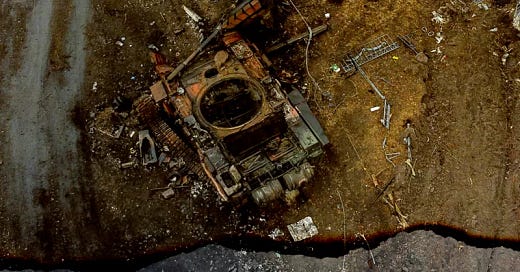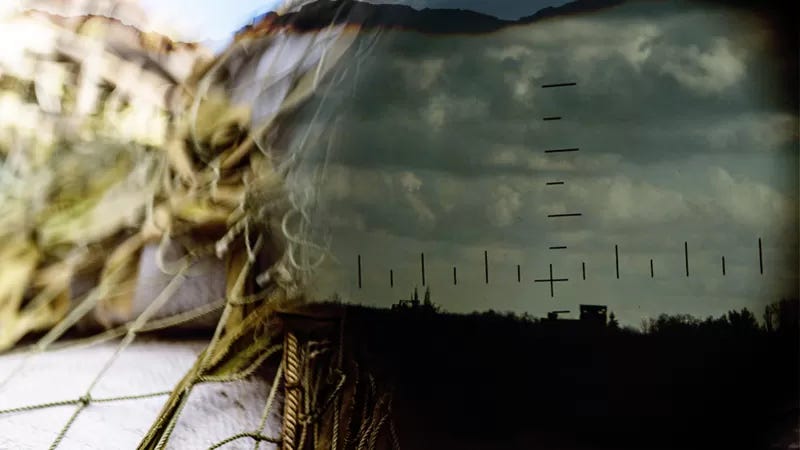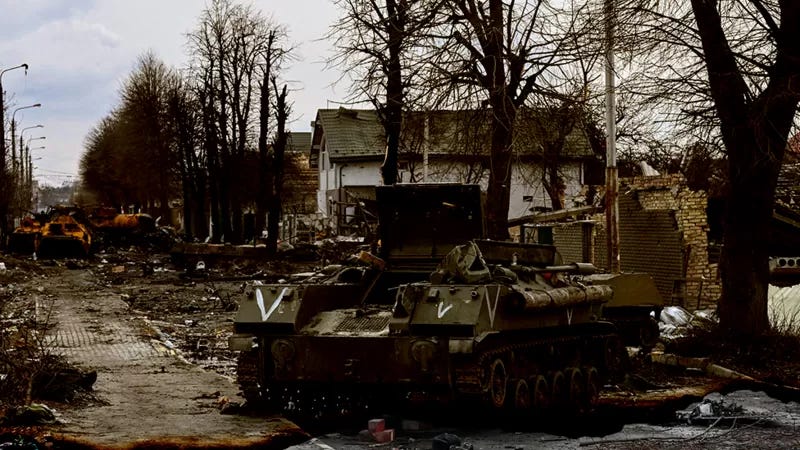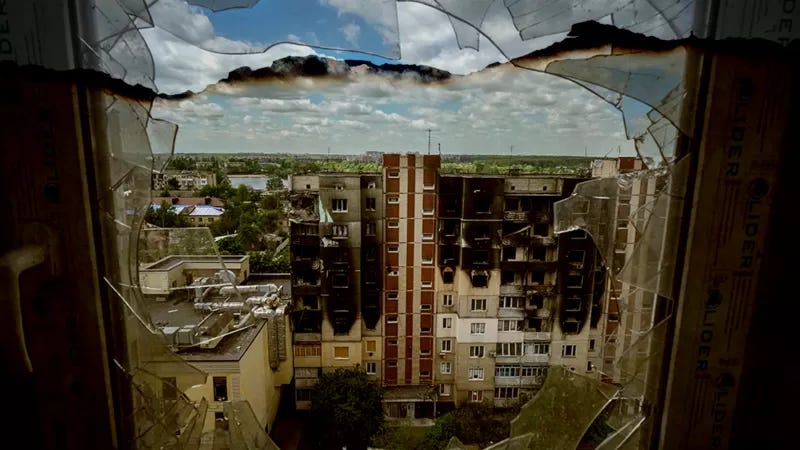"I’m not going there anymore." How Russian contract soldiers are being summoned back to the war in Ukraine
Russian soldiers tell the BBC their stories of escape from the war in Ukraine.
By Olesya Gerasimenko
Contract soldiers who quit the Russian army in the first months of the war in Ukraine are being sent back to the front line — this time under the new draft laws. Young ex-soldiers are fleeing across the border, accepting prison terms or going to psychiatric clinics to avoid ending up back on the battlefield. They explain their reasons to the BBC Russian.
— I’m an artillery gunner by profession, so I never personally killed someone with a weapon in my hands. My job looks like this: a spotter with binoculars gives me the coordinates of the target, the officer calculates the angle and I point the sight and press the lever. It’s not made of iron - it's not hard. I don’t see the ones who are killed. In the artillery branch they tell you "the target’s been processed", and that's it.
— Where do they teach you that?
— Well, in theory, in the army, but I didn’t have any training like that. In our unit we went out twice during my contract, just to drive around and aim at a target. But we didn't shoot at anything.
— So the first time you fired a gun was when you entered the territory of Ukraine?
— Yes. The first time we fired shots was near Bucha.
— That is, you’re in a war for the first time in your life and it’s your first time firing a gun too?
— Yes.
At the start of our conversation, 20-year-old Sergei from Krasnodar is terse and reluctant to speak. In July, he deserted his battalion in Popasna. He stayed at home for several months and didn’t talk to anyone about his five months on the battlefield. On September 23, however, he received a call from the military prosecutor: "Either you return on Monday, or you go to jail."
"I'm not ready to go back", says Sergei. During five months of war, he saw "almost everything — he can’t do it anymore."
"No Aims, No Plan"
19-year-old Sergei was called up for military service in the spring of 2021. By August he had been offered a contract. In recent years, the Ministry of Defence has been switching as many young people as possible to this form of service. The figures were needed for departmental reports on the number of professional soldiers in the army.
At the end of January, Sergei and his fellow soldiers were sent to Belarus for training exercises. The youngest was 18 years old. "We found out we were going to Ukraine on February 23", says Sergei. They were told they would all be going there "unless a decision comes from on high before nightfall." They were given enough field rations to last three days.
— Couldn’t people escape?
— Once you’re there, there’s nowhere to run to.
No-one fired at them as they drove towards Chernobyl in tanks that were "in tip-top condition, polished and prepared by mechanics." Then, in Gostomel, a battalion of almost 600 people was hit by Ukrainian artillery shells. "All at once there are five corpses and dozens wounded — even the soldiers inside the tanks, the shells still got through. BMP-2s are thin — they’re easy to penetrate."
On that day, Sergei saw a dead body for the first time. A fellow soldier - a 19-year-old, who he’d served with near Krasnodar, lost his life.
"People started to panic. We drove into some warehouse in the forest. We stopped, at a loss what to do. Stupidly, we had no idea whatsoever, and the commanding officers didn’t know either. The battalion commander yelled at them: "Why the f*** are you just standing there?!" and then they told us to "get into position".
Sergei's regiment "scraped out some trenches" for themselves and spent the night in the forest. According to Sergei, it wasn’t just them who’d come under fire that day. The Ukrainian forces "completely destroyed one division", leaving the survivors to wander through the forest at night "to some place, f*** knows where." "Well, our guys started shooting at them. And they started yelling." As far as Sergei knows, just one person was wounded.
In the morning they drove a couple of kilometres to another forest. At the time, the Ukrainians were bombing the warehouse where the regiment had first set up camp (the BBC has seen a video of the strikes).
The commanding officers had no aims, no plan, says Sergei. There wasn’t even any food — we had to stretch out the ration packs that were supposed to last us three days.
"No one explained why there wasn’t any food. Our commanding officers didn’t eat anything either. As for the regiment commander, I don’t know. But they have a reconnaissance platoon which cleans out all the shops, so I think they had plenty to eat."
"They finished shooting and went back to getting hammered"
In the first days of March, Sergei’s battalion drove into Bucha: "We covered the infantry with artillery fire." They took position in the very centre of the city, got out of their tanks … and were hit by a shell within half an hour. "Right away we lost two deputy regiment commanders, our battalion commander and a whole slew of soldiers." Among the dead was another of Sergei’s Krasnodar buddies.
When a commander dies, a new one is appointed from among the remaining soldiers. But on the front line there aren’t many people with experience. Most are 19 or 20 years old, says Sergei. “You’d get the occasional gun commander who’d been in service for five years. Our gun commander had done 12 years’ service, but he’d never been in combat, he’d only served in the unit. He lost his mind within a week. He got drunk and climbed to the second storey of the apartment block. A shell exploded somewhere in the distance, he jumped and broke his legs. They took him away — didn’t pay him his wages, and now he’s on the psych ward."
In Bucha, the soldiers began looting empty homes and shops. "Right from the start there was nothing to eat. We took tinned food and bread." They lived in the basements of apartment blocks, with the local residents at one end and the Russian military at the other.
"If any locals approached our positions, they were taken, interrogated and killed almost immediately. They used to use their phones to send our location tags to the Ukrainian Armed Forces. Sometimes you’d be sitting there and a man would ride past on a bike. Then, a minute later, our location would be hit. You’d get real characters — there was one man on a quad bike who filmed us all on his phone. He had ‘Warrior of Light’ written on his helmet, ****, and ‘Light Warrior’ on his bike. They caught him and killed him right away."
At the same time, on the topic of the photos of mass burials which emerged from Bucha, Sergei says that "there are staged ones too." In some shots, he recognised the pits that the Russian military had dug to disguise a tank: "In the photo there’s a cross next to it. But we know those aren’t grave pits. They just make it look like there are corpses there." Sergei doesn’t explain the contradiction with his own account of how soldiers would shoot locals suspected of helping the Ukrainian military.
The soldiers drank a lot, Sergei says. They managed to find alcohol everywhere — in people’s homes, in shops. Vodka, whisky, bourbon, liqueurs, gin, rum, cognac, grappa and grape-brandy. But if they received target coordinates at the same time, they just crawled out and fired their guns while still drunk.
— The adrenaline sobered them up?
— Not really. They finished shooting and went back to getting hammered.
On quiet days, they’d have their own barbecues in the yard. The locals didn't go near. "They all knew that if they left their houses’ basements, we’d open fire. That’s what they were told as soon as we arrived in Bucha — when we went round all the houses and cleaned out the ones who worked for the police, the Ukrainian military, the people with documents or something on their phones ... Actually, we took away all the men."
— And what did they do with the women?
— That depends. I didn’t do anything. And my first battery didn’t do anything either.
"The tank didn't even go"
Their combat mission was to shell Irpin, located five kilometres from Bucha. The artillerymen fired at the town every day for two weeks, and the infantry kept trying to take it. "Our troops made three or four attempts, but they couldn’t advance further than five hundred metres, let alone take the town. The Ukrainians had tanks, whereas our foot soldiers were in an infantry fighting vehicle. Infantry vehicles can’t puncture a tank. Every day they came back with losses."
The soldiers were told they’d soon be relieved from their duties. "Soon — they’d say — others will come. Now we'll take the town, and you’ll be replaced. It’ll happen soon." But no one came.
On March 19, a Ukrainian artillery shell hit a Russian tank. It exploded and caught fire. People started to panic and the fire spread to neighbouring tanks. In the end they only managed to drive away with one. Six tanks burned to the ground, recounts Sergei.
Their possessions where burned along with the vehicles: from sleeping bags to underwear, as well as bulletproof vests, helmets and machine guns.
New weapons were issued a day and a half later, and after a couple of days two tanks arrived. One had a gear stick that didn’t engage and the other, issued in 1964, didn’t fire at all. "It didn’t even go — they constantly had to jump start it with wires from another vehicle." Nobody’s personal items were replaced.
The Russian military never took Irpin. On April 2, when the Ministry of Defence announced the withdrawal of troops from the direction of Kyiv and Chernihiv, Sergei's squadron came under fire for six hours. "They couldn't lift their heads up." After waiting another hour, during which time no shots were fired, they came out of the basements, fired 28 rounds at the Ukrainians and drove back. Almost all the tanks were destroyed. 40 soldiers were forced to stick armour to the three remaining tanks and ride on top.
"They’re all just 19 years old. And now they are missing in action"
Sergei's regiment returned to Russia via Belarus. When they arrived at the first stop there were already two squadrons, each of 90 soldiers, who wanted to leave. But after being persuaded by the commanding officers they’d be sent to jail if they did, they remained with the battalion.
In Belgorod, they spent two weeks camping in the forest, driving a Kamaz truck into the city to buy food, since there "they weren’t fed either, there were no ration packs." It was then that Sergei wrote two letters of resignation and a letter of withdrawal from the special operation, but "… nothing happened, it didn’t get anywhere in any case. We gave them to the regiment commander and he didn’t even read them."
A contract soldier from another battalion, 19-year-old Anton from Ivanovo, told the BBC that in May he and his friends were threatened by commanders "with a military tribunal, bullied and yelled at that we’d be shot in the back if we turned around and left." "But some of the guys left anyway, just like that, without even handing in their resignations. They just laid down their weapons and walked away when they were on patrol. People were always leaving. On one occasion an entire communication battalion resigned. There were 60 to 80 of them. It got to the point that they wanted to take the commander to Ivanovo in handcuffs."
"You know, there were guys there who were fanatics, who signed volunteer contracts for one month, three months. They’d go into battle with us, advance, then turn right round on the battlefield, lay down their weapons and leave, saying they were done. In the end we caught a ride out of there as well."
— What happened? Why?
— Well ... the losses there were big. In May, for many battalions it was a good thing if there were 10 people left. It has a profound effect on your mental state too. As soon as I started to shoot at people and to understand that it’s… hard… And they don’t even send the guys home who’ve been killed. They would bury them right there in front of me. They hardly ever do a Cargo 200 [codename for military fatalities]. Especially when the temperature there was nearly 40 degrees. They just decompose right away. And they don’t tell the parents anything, they just write "missing in action". There were a lot of guys whose contracts were ending within a month or two. They were all 19 or 20 years old. And now they’re missing in action. For the parents, they just disappeared. On the way home we saw men at the border who could hardly wait to fight. But they don't understand what it means. On the news they’re shown everything differently.
- You’re a sniper. You say that you spent two weeks in the war and took part in three military engagements. Did you count how many people you killed?
- There's no time to count.
"There were 21 houses in the village. It took us a week and a half to capture it"
Sergei was sent back to Ukraine in mid-April. On the way to the border, an apparently new tank broke down, its engine heating up to 120 degrees every three kilometres. “You can’t travel on something like that — we had to keep stopping and waiting for it to cool down. It took 12 days to repair. Then, as soon as it came off the Kamaz truck which was delivering equipment to the border of Ukraine, we went over the line on it, and it overheated again after 5 km. They took it to Luhansk for repairs, but they couldn’t fix it there either."
All that time, Sergei says, he was thinking about how to escape. "My first thought when I woke up every day was that I wanted to give up." But in the end he found himself in a "brick loaf" of a vehicle (‘brick loaf’ or ‘bukahnka’ in Russian is a nickname for an old Soviet era minibus), without a tank, on his way to the front line to serve as second gunner to another crew.
Sergei was brought to the outskirts of Izyum. "But our regiment didn't take it. We just stood around for a month without once firing the artillery. We oiled our tanks and dug trenches. At night we went on patrol. Well, at least they brought food to us there."
The detachments that had entered Izyum at the beginning of April found themselves unable to leave. "They’ve got those Javelins, you know. The tank crew told us how you’d start your tank up, hoping to get out of there, when some missile would come flying at you from the Javelin." (Javelin is an American portable anti-tank missile system which the US supplies to the Ukrainian armed forces.)
From his position near Izyum, Sergei was sent to take a bridge located 20 kilometres from Lysychansk, whose name he no longer remembers. The Ukrainian troops stood on a hill and fired shells to stop the pontoons from being built. "And we just stood there as well. We didn’t shoot. I don’t know why. But the tanks that left for the river with the plan of crossing it on the pontoons, they never came back from there." There used to be forest around and along those roads. In April it was razed to the ground by artillery, says Sergei.
Sergei’s regiment moved off in the direction of Lysychansk. When they got there, they were told to occupy the village of Berestovo, which was located on the road and had a good view of all the surrounding forests. "Twenty-one houses. It took us a week and a half to capture it."
In the course of one of the attacks, a shell got stuck in a Russian tank, exploding right in the barrel. "The whole turret was blown apart. Everyone who was inside or standing nearby burned to death." Sergei explains the accident by the fact that the shells were a new kind of thermobaric projectile. "No one had any real idea how to work with them. They were hardly ever used and people didn’t know how to handle them."
Rumours spread that there were three Ukrainian regiments at Lysychansk containing one and a half thousand soldiers, with an additional five thousand soldiers at the factory outside Lysychansk. "By then there were already very few of us. Two regiments had been combined into one, but all the same, the number of people remaining was around 300. And almost no-one was over the age of 20."
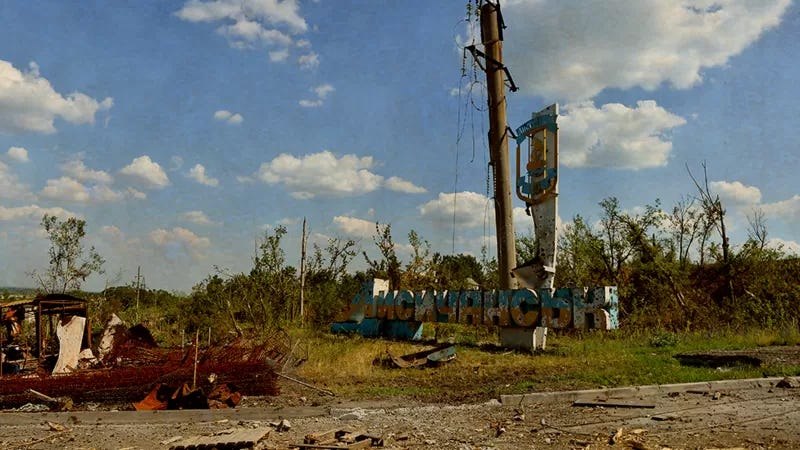
By that time, Sergei recalls, of the 600 people in his battalion who had crossed over from Belarus in February, just one company of 90 people remained. Another contract soldier, Anton, described how he saw "around 10 people wounded and around 10 people killed" in each short military engagement.
Both Anton from Ivanovo and Sergei from Krasnodar claim that "two to four times a day" the Ukrainian artillery division used cluster bombs and phosphorous bombs, which are banned by the Geneva Convention. (The BBC has a video of one of the attacks, resembling the flicker of an exploding firework, but in wartime conditions the editorial team can neither confirm nor deny the authenticity of the recording). Russian squadrons of contract soldiers also had cluster bombs, Anton confirms, which they fired "only in response". Sergei says that they were "not permitted to use this weapon."
Human Rights Watch has reported that both Russia and Ukraine have used cluster bombs in the course of the war. The BBC has also found evidence of Russian use of cluster munitions.
"You either go to jail or you go back"
In July, Sergei's regiment was moved to Popasna, "— a city of ruins, destroyed by both sides, where bombs from the Ukrainian Armed Forces fall every day", and escaped. He handed his weapon to his commander and left. Seven others from different cities fled with him.
On July 10, at the Pervomaisk border crossing point, they asked a border force lieutenant: "We left the war, what should we do?" According to Sergei, the lieutenant replied: "You’re not the only ones — I see a hundred a day. A Kamaz truck will come to collect you now and you’ll be taken to the FSB interrogation point."
The contract soldiers weren’t questioned for long, Sergei says. But they did cause surprise with the stories they told of people being killed. "Here they say that there aren’t any losses", the interrogators shrugged. Sergei was collected from Kamensk-Shakhtinsky in a friend’s car. He didn’t join his unit. In the five months of war, he’d received about 700,000 roubles — approximately 140,000 roubles a month.
A few weeks later, Sergei was summoned to the commandant’s office for questioning. "They asked me when I’d left the zone of action, and why. I said that I’d had enough and showed them a video of our battered division in Bucha, burned to the ground" (this video has been seen by the BBC). The contract soldier was released.
On September 23, however, Sergei was once again summoned by the military prosecutor. In his unit, he was referred for a medical examination and told: "You have two options. You either go to jail or you go back."
The gunner spent three days playing video games (he likes horror) before deciding that he wasn’t going anywhere. He spoke with a lawyer and now has to choose between two options: to either receive a suspended sentence for terminating his contract and not complying with the draft, or make use of a psychiatrist report when he attends the military enlistment office.
Another contract soldier, Sergei Bokov from the Ural region, who in May talked to the BBC about his unsuccessful advance on Kyiv, managed to travel to Kazakhstan and is planning to obtain a humanitarian visa in Germany.
On September 25, Anton from Ivanovo once again set off to the front line.
Read this story in Russian here.
Translated by Camilla Yermekbayeva.

